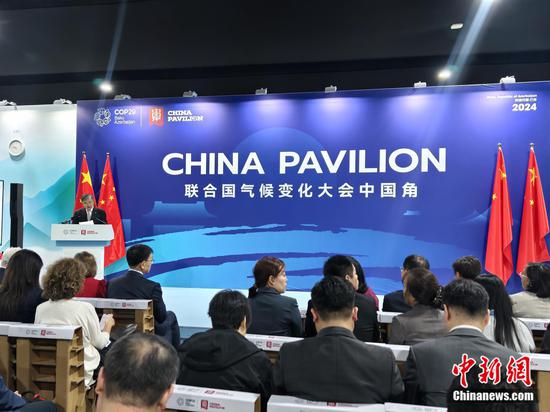Insights | China's experience on tackling climate change benefits the world: UN experts on COP29
By Meng Xiangjun, Lin Zhuowei, Chen Tianhao, Wu Xinru
(ECNS)— As the 2024 UN Climate Change Conference (COP29) kicked off on Monday, delegates from around the world convenes in Baku, Azerbaijan for two weeks of crucial negotiations, dynamic discussions, and global collaboration. With urgency and ambition, participants gathered and held dialogue and discussions on tackling the climate crisis.
On the same day, Side Event on Ecological Civilization and Beautiful China Practice was successfully held at the China Pavilion, hosted by Research Center for Xi Jinping Thought on Ecological Civilization in partnership with Policy Research Center for Environment and Economy of the Ministry of Ecology and Environment (PRCEE).
At the event, Chinese representatives outlined the nation's national climate strategy, highlighting its efforts to achieve green transformation across economic and social sectors. Key points included ongoing pollution control measures, a comprehensive approach to natural resource management—including mountains, rivers, forests, and grasslands—and China's commitment to international cooperation on ecological civilization. They expressed hope that COP29 would strengthen global confidence, affirm the principle of "common but differentiated responsibilities," and advance the implementation of the Paris Agreement.
Several UN officials and climate agency leaders worldwide commended China's contributions to green transformation and climate commitments, stating that the country's experience offers valuable insights for the world.
Erik Solheim, former UN Under-Secretary-General, noted that China's way of environmental protection may not be easily replicated, but China has set an example for the rest of the world.
First, China promotes tree planting, according to Solheim, adding an example of the Kubuqi Desert in China's Inner Mongolia that China shows the world how to turn a desert into a green land. Second, China protects endangered species. Solheim further explained that China has made progress in protecting pandas, snow leopards, and gibbons. Lastly, China reaches a balance of the protection of natural environment and cultural heritage, said Solheim.
"There can be no cooperation without dialogue, and there can be no cooperation without negotiation", said Ms. Noura Hamladji, deputy executive secretary of United Nations Climate Change. She believes that this attitude is well reflected in China's concept of ecological civilization and its Beautiful China policy.

Hamladji commended China's support for developing countries to join climate cooperation. She said that China is already the world's largest investor in renewable energy. She further pointed out that China’s investment in renewable energy and batteries, is a prime example of how international China has become.
Inkar Kadyrzhanova, a senior natural resources officer at the FAO Office on Climate Change, Biodiversity, and Environment, highlighted the complexity of the current situation, which is influenced by multiple challenges such as climate change, biodiversity loss, and food security issues.
Kadyrzhanova warned that if no action is taken, around one million people or more could face hunger by 2030, citing relevant statistics. She called on the international community to tackle these challenges collaboratively, emphasizing the need for solutions that are efficient and accessible to the entire population, including women, people with disabilities, and those in disadvantaged areas to align this transformation with the principles of sustainability and equality.
China has been promoting global climate governance in green and low carbon transformation and implementing various policies to promote investment in technology, building resilience, infrastructure construction and so on, noted Dechen Tsering, director a.i., Climate Change Division, and director of Regional Office of Asia Pacific of UNEP.
She added that these initiatives have not only promoted domestic sustainable development but also served as a valuable model for the world. Multilateral efforts are critical to achieving climate goals.
Fred Krupp, president of the Environmental Defense Fund, a U.S.-based nonprofit environmental advocacy group, said the year 2035 will be a milestone on China's journey from its goal of carbon peaking to its goal of carbon neutrality to promote the building of a beautiful China.
To facilitate China's green journey, Krupp advised intensified efforts in three aspects: first, more ambitious, concrete reduction goals should be determined nationally, which provides new momentum for both economic growth and the green low carbon transition; second, China should further its technological innovation and continue to reduce air pollution by leveraging advanced technologies and tools for more precise pollution control; third, China should encourage nations worldwide to mobilize their resources for biodiversity financing, advancing the Kunming-Montreal Global Biodiversity Framework.
